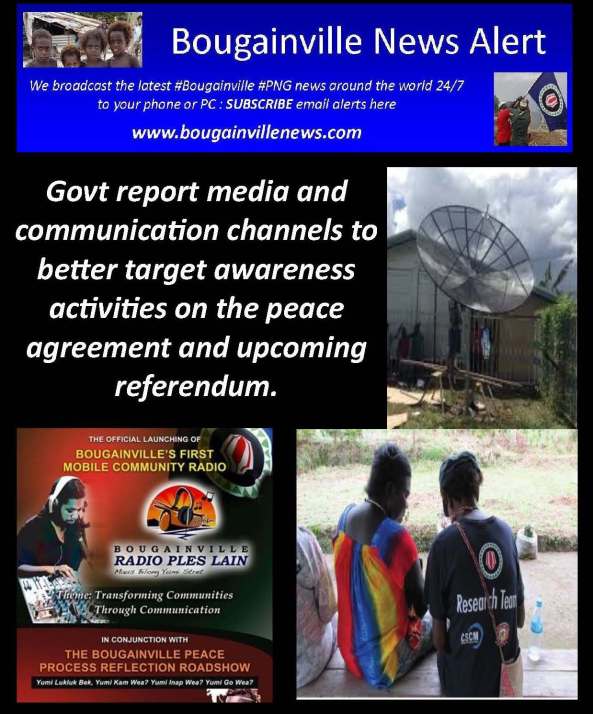The following Public Health Measures are issued as a response to the exponential rise in confirmed Covid-19 cases in Bougainville.
Updates
ABG #Covid19 Public Health Committee : 14 new Covid 19 reported on Saturday 28 Feb- ARoB total cases at 23
If you have Covid-19 symptoms such as fever, dry cough, sore throat or shortness of breath, call toll-free : self isolation at home and call ABG toll free number 74460830
Pursuant to the Ministerial Directive issued by Hon. Raymond Masono, MHR, Health Minister dated 26 February, 2021, as Secretary Health, and Chairman of the Bougainville Covid-19 Public Health Committee, I hereby issue the Public Health Measure No. 02 of 2021.
1. The clinical medical officers within Covid-19 Rapid Response Team will step up compulsory Covid-19 contact tracing tests within regional health facilities of Arawa, Buka and Buin.
2. Swabs will be done on any patients who exhibit Influenza Like Illness (ILIs), simple cough, pneumonia, and Severe Acute Respiratory Infections (SARI) when attended to at the regional health facilities at Buka, Arawa and Buin, and based on referrals from District Health facilities.
3. All Covid-19 Medical Clearance Certificate issued by recognised public and private Medical Officers as compulsory requirement for entry into Bougainville through air and sea ports is hereby lifted.
4. A GeneXpert or Polymerase Chain Reaction (PCR) test will be conducted at points of entry for both inbound and outbound passengers who exhibit Influenza Like Illness (ILIs), simple cough, pneumonia, and Severe Acute Respiratory Infections (SARI) and a body temperature above 37 Degrees Celsius.
5. The role of the Gazetted National Dep’t of Health Quarantine Officer is hereby affirmed consistent with the Quarantine Act 1953 to continue routine quarantine checks at points of entry, and maintain food and safety standards inspection as part of the ‘Niupla Pasin’ protocols.
6. As part of the Covid-19 Public Health Measures the following must be observed and adhered to by all persons at schools, churches, sea ports, airports, business houses, work places, social clubs, restaurants, public parks and markets, towns, and other public gathering spaces:
6.1. Social distancing of 1metre – 2metres,
6.2. Mandatory body temperature checks,
6.3. Wearing of face masks or shields,
6.4. Hand washing facilities and resources,
6.5. Covid-19 awareness materials.
7. In the event of confirmed community transmission within an education institution in AROB, the Bougainville Education Board working in consultation with the Covid-19 Public Health Committee, will suspend teaching and learning in targeted school(s) pursuant to Section 57, subsection 1(b), of Bougainville Education Act 2013.
8. Consistent with Public Health Measure No. 07, alternative modes of study such as home study, distance learning, online learning, and other learning approaches be recommended by respective schools or institutions for the affected students.
9. With evidence of high prevalence rate of community transmission, all travellers between rural and urban constituencies are hereby advised to practice home isolation to prevent further spread of the Covid-19 infection.
10. Departmental Heads, Business Houses, Town Managers, and other responsible authorities to be notified by Chief Secretary or Secretary Health in consultation with Chief of Bougainville Police Service if no compliance with Covid-19 Public Health Measures.
11. All Urban Community Governments in three (3) Regions (North, Central, South) to take a lead in managing public health, water, sanitation and hygiene measures in four (4) main town of Buka, Kokopau, Arawa, and Buin).
12. Alcohol consumption to be regulated under the Community Government Act 2016 and Liquor Act 1963 consumption regulations and laws. Directives could be issued by the Chief Secretary in consultation with Secretary Community Government and Chief of Bougainville Police Service for enforcement.
13. The Motor Traffic Act 1950, and relevant regulations in the land transport sector will be enforced by the Bougainville Police Service through its Traffic Division to ensure there is no overcrowding, and other related traffic related offences.
14. All domestic vessels may berth at the ports of entry in Buka and Loloho, Kieta, and Kangu Ports to allow for routine quarantine checks. No shipping crews be allowed to disembark the ships without proper quarantine checks.
15. Pursuant to Public Health Measure No. 14, all foreign vessels must still be cleared at anchorage.
16. All small crafts moving between nearby Maritime Provinces and Bougainville must comply with endorsed Covid-19 public health measures.
17. In the event of lack of compliance with the Ministerial Directives and Public Health Measures, the Bougainville Police Service under its community policing program will intervene to ensure peace, order, and stability within the three (3) regions consistent with the Police Act 1998, Summary Offences Act 1977, Criminal Code Act 1974, and other related law enforcement Act to ensure compliance and adherence to the Quarantine and public health protocols.
All other relevant public health measures issued by the Ministry of Health on 22 January, 2021, and 29 December, 2020 remains enforceable.



















You must be logged in to post a comment.